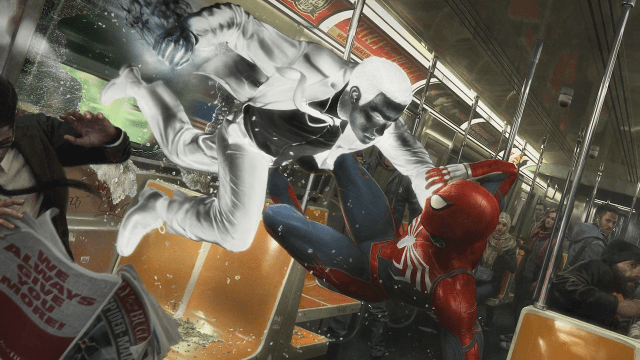Spider-Man PS4 was a superb superhero romp that got a lot right about the character, universe, characters, combat, and more. The emotional impact of Spider-Man PS4, however, was an underrated and overlooked part of the game that got lost in the shuffle. Insomniac Games’ critically-acclaimed title could have fallen flat for many reasons, but this—more than anything else—needed to be perfect to deliver a poignancy that has been a staple of Spider-Man’s 56-year history. And it did.
[Best of 2018] – Spider-Man’s Comic History is Steeped in Emotion

There’s a reason why the webslinger is one of the most beloved comic book characters of all-time. Ever since Steve Ditko and the late Stan Lee created Spider-Man, the character has struck up an affinity with kids, teenagers, and even adults due to his relatable flaws. Guilt, loneliness, inadequacy, and money problems—issues that other superhero comics hadn’t covered extensively—have been featured prominently in the Spider-Man comics and films, and are ripe for adaptations in other forms of entertainment. With a need to remain grounded and as accurate as possible to Spider-Man’s comic book history, Insomniac Games needed to implement this side of the character correctly to draw the right reactions from players.
It was essential to make exhilarating traversal, fluid combat, and pretty visuals. But without the emotional impact that Peter and Spider-Man display in-game, there would be no real connection between the player and the character. There needed to be a reason behind Peter and Spider-Man’s motives in the PS4 title—and what better way to display this than adding a supporting cast ripe for emotional exploitation.
[Best of 2018] – Spider-Man PS4’s Supporting Cast Play Their Part

With the hero’s relatable flaws in place, Insomniac needed other imperfect yet interesting characters to bounce Peter and Spider-Man off of. Spider-Man’s comic book lore has an abundance of these types of individuals to choose from, and those selected were the right options for Insomniac to add into its game.
The inclusion of on-again, off-again girlfriend Mary Jane Watson provided a tug on the heartstrings from a romantic point of view; a constant within Spidey’s comic book history. Gwen Stacey may have had a greater impact on defining Spider-Man’s character moving forward in that medium, but there’s no doubting that MJ was the right addition given the long-running narrative between the pair.
The decision to involve Otto Octavius—a.k.a. Doctor Octopus—in the game proved to be just as crucial. Viewed as a father figure and as someone who could have changed the world in different circumstances in Peter’s eyes, Doc Ock provided the perfect emotional resonance to the story as it unfolded. His slow fall from grace is like a Shakespearean tragedy and offers the necessary emotional clout to the climax of the game’s third act. Peter’s struggle to defeat his friend-turned-foe—the ultimate betrayal for Peter after all of the help they have given each other—shows the turmoil that he’s going through despite his otherwise cheery disposition.
There are other notable emotional moments throughout the game as well. The death of Miles Morales’ father during an awards ceremony, Peter’s relationship with Aunt May, the fallout from the game’s ending, the cause behind Martin Li’s vengeful crusade, and uncovering the reasons behind Harry Osborne’s absence all yield more touching moments. It isn’t just Peter who is affects players emotionally during Spider-Man—the supporting cast help a great deal as the stakes grow ever greater throughout the plot.
[Best of 2018] – How Spider-Man PS4’s Emotional Impact Stayed True to His Roots

There were plenty of plaudits that fell in Insomniac’s lap before and after Spider-Man‘s release in September. The web swinging mechanic was an utter joy to behold, and hearkened back to the days of Spider-Man 2 in 2004 while also bringing itself to modern standards. The combat took cues from Rocksteady’s Batman Arkham games but made it more true to Spider-Man’s moveset. Its score was also superbly composed and its visuals were as competently crafted.
These aspects were terrific on their own but they were significantly improved because of how each part built upon Spider-Man‘s emotional resonance. The game’s mechanics could stand on their own but gained more meaning when used as vessels to interact with and help the rest of the cast. Even just strolling around doing crimes is more enjoyable because it feels like something your friendly neighborhood Spider-Man would do.
The ability to make players feel saddened, angry, inspired, or any other emotion is the major reason why I—and probably a lot of others—kept playing. Ignore this vital part of the character, and Spider-Man wouldn’t have created as strong of a connection between players and the characters nor would it have remained as loyal to his comic book roots.
You simply cannot have Spider-Man without emotional context or impact. It just wouldn’t work due to the amount of history within the character’s comic book lore. Peter and his alter ego strive to be good in a world where he isn’t universally adored—here’s to you, J. Jonah Jameson—and the desire to do good is an innate one for most humans. That’s what makes Spider-Man such an icon to many. It’s what makes Spider-Man PS4′s emotional impact so crucial, and why Insomniac were applauded for its accurate portrayal.







